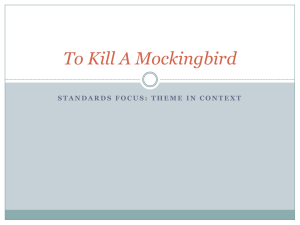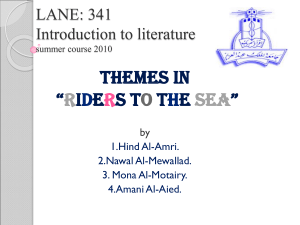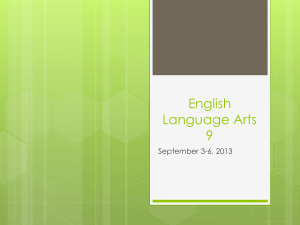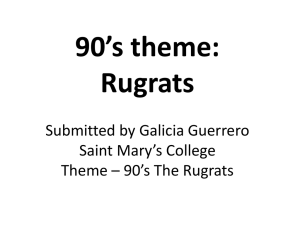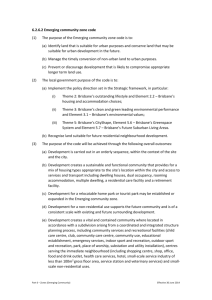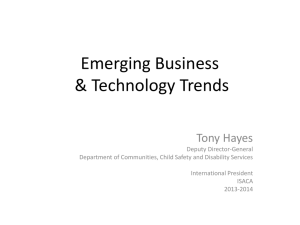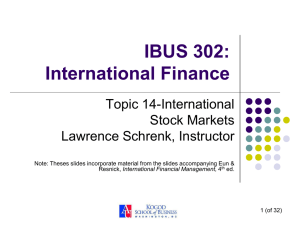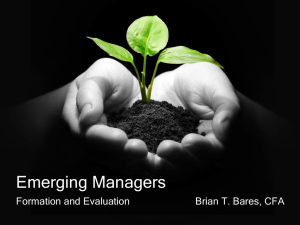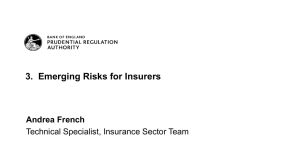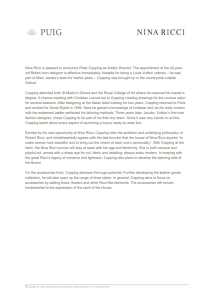Sally Elton Chalcraft Enabling student teachers to facilitate creative
advertisement
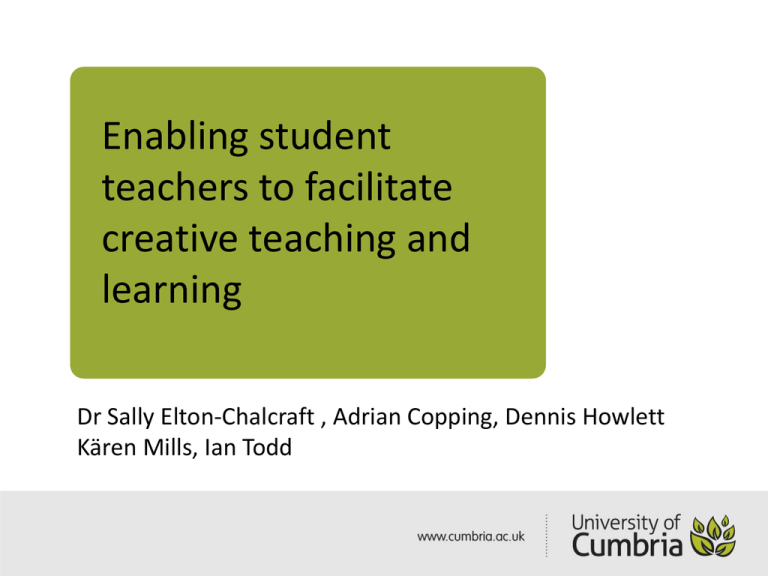
Enabling student teachers to facilitate creative teaching and learning Dr Sally Elton-Chalcraft , Adrian Copping, Dennis Howlett Kären Mills, Ian Todd Context: Phases 1,2 and 3 •300+ PgCE students 3 campuses : M level “the Creative and Effective curriculum” assessment: individual rationale + group annotated plan. •Reflection on theory and practice - keynote lectures, interactive seminars and directed activities, 1 week placement (2 -5 students in each class). •Phases 1,2 and 3 – •Evaluation of module in enabling student teachers to facilitate creative teaching and learning •Phase 1 -TEAN storehouse (Elton-Chalcraft, Hansen, McCreery and Morris 2010) •Phase 2 - Education 3-13 (Elton-Chalcraft and Mills) •Phase 3 – TEAN, ECER (Elton-Chalcraft, Copping, Howlett, Mills and Todd) Research Methods and Sample Phase 1 and 2 Phase 3 An evaluation of the impact of the Creative and Effective Curriculum module on the learning of: student teachers; children and teachers. 4 schools, 4 tutors- Lancaster campus 120 Children, 50 student teachers, 9 teachers : questionnaires 12 Lessons observed by 4 tutors Interviews and essays : 6 students Does the module enable student teachers to facilitate creative teaching and learning? Themes emerged through a grounded theory approach of data reduction (Strauss and Corbin 1998) 5 schools 5 tutors- Lancaster campus 10 teachers interviewed 5 focus groups of children 48 Student questionnaires Interviews and essays: 5 student teachers Findings phase 2 6 Factors perceived as necessary for creative and effective teaching and learning : • • • • Children felt ‘liberated’, ownership of learning Learning was ‘fun’ and challenging Achievement was through intrinsic motivation Teacher took on role of facilitator, rapport between teacher and children was crucial (trust, humour) • Engagement in practical activities and imaginative/problem solving scenarios both in a group and individually • Providing a safe environment to take risks and learn through mistakes Findings phase 3 Focus groups: •Did teachers and children think the week was effective in promoting creative teaching and learning? Why/ why not? Questionnaire: •Did student teachers consider creative teaching and learning occurred? •Did the module facilitate this? •Do they think this is an effective approach? Emerging theme 1: Fun/Challenge •‘the creative teachers actually built loads of stuff in our classroom for us like caves’ •Learning is not motivational when it is ‘normal’ = worksheets, instructions •‘The measuring was well easy.’ (Y1) •Some of the activities were great fun but the differentiation just wasn’t there. Like that measuring activity in Year 1 where they were using fingerprints as non-standard measures. The really bright boy in there was bored with that. Emerging theme 2: Motivation •Easy work is not motivating •I did notice the students came up with theme-based extrinsic rewards that they had clearly spent a lot of time and money making, laminating and preparing. Perhaps the students believed these theme-based rewards would be a motivator but there was no evidence from my interviews to suggest that staff or children thought this. (University Tutor) •There again loads of the activities were exciting and really visual and when they were engaged with those their behaviour wasn’t a problem. •I wanted to join in when they said what we’re gonna do over the week and they said that we’re make the cars and when they said that I really wanted to do it. (Y3) Emerging theme 3: Relationships Students and students •some fell out – group work can be challenging (quest data) Students and children •I think having a change from their normal teacher helped some of them as well. •They were really kind to us and smiled. (YR) •They were sensitive and fun. (Y1) •Overall it has been more informal, but for a few children this may have been a problem. (behaviour sometimes seen as a problem when students are more informal). I’m almost expecting them to call them by their first name Emerging theme 3: Relationships Children and children •In Year 6 where lots of our boys don’t get on there was no bother at all. •I’m not sure about strengthening the relationships between the children. I mean obviously we’ve been doing exploratory stuff and that’s all good for social aspects of learning, I guess, but I don’t know much evidence I have to say it strengthened relationships. •It’s been different because I’ve been in a group with some people that I don’t usually play with. I don’t usually play with them cos they’ve got other friends but I found it really good. (Y4) Emerging theme 3: Relationships Students and teachers •I like the supply teachers in because normally Miss … doesn’t really know how to handle us but with like five teachers in the room they’re all really good at handling us because we’re a bit of a crazy gang. (Y4) •(this comment came from children in a class where the class teacher had been singularly unhelpful and occasionally oppositional to the week and absented herself from the class for most of it) Emerging theme 4: Engagement in Practical Scenarios •Where they did the treasure hunt around school, the children were really excited about it. •In Year 2 we made little boats. We took them home and it was arts and crafts and I really like arts and crafts. They were paper boats and we had to see if they would…float. (Y2) •I mean the trip to Asda as well in itself, absolutely fabulous. They all had their own money; they went and chose what they wanted; they went to the self-service; they paid themselves; they got the receipt, everything. They were just brilliant. Emerging theme 5: Risk taking •It was clear that the teachers and school generally were keen for there to be products to show the parents. A number of students felt constrained by time to create these products and I think this mitigated against too much risk taking and having time to learn through mistakes. During the car making in year 4, the student provided a template for the body work instead of allowing for experimentation with aerodynamics. His response when asked was ‘not enough time’ •My students have been fantastic and I think the good thing about creative week is that it encourages teachers to take risks. That’s really important. When I trained as a teacher I remember being told: take a risk because you learn so much from it if it doesn’t work Emerging theme 6: Enthusiasm to cope with change •We are a very vulnerable school, with our results…So for us, to take a week off is just too much. [I think the viewpoint that a creative week is a “week off” perhaps shows that the interviewee hasn’t embraced the importance or value of a creative approach]. •I got the impression that the students had planned exciting, interesting activities but that’s where they had started from. Rather than looking at the LO first or any creative technique I think they had thought, “What would be an enjoyable thing for the children?” and then went with that rather than the other way round. •The children liked doing something new and different and gained a lot of new learning. The impact of school-embedded learning work •The SE days helped mostly indirectly, as it meant we had some idea of the children and so could plan more specifically for them. The visit days were crucial for checking ideas with the teacher and checking resources etc., as well as refreshing our relationship with the children. •We had some knowledge of the children but were in the school in a different capacity earlier on. •School-embedded was negative in some instances as teachers in the school remember us from the 1st week in September where we had little experience forgetting that by the end of March we had developed a lot. Next Steps •Picking up on themes from questionnaire data with focus groups of students in June Workshop Discussion •Q and A about the project Sharing practice•How do you enable student teachers to facilitate creative and effective teaching and learning? •What are the constraints and opportunities which impact on our teacher education? Acknowledgements • We would like to thanks all the students teachers, tutors, children, teachers and co researchers for participating • See the full report of phase 1 on the TEAN website http://www.cumbria.ac.uk/TEAN/TeanHome.aspx https://stream.cumbria.ac.uk/ap/tean/index.html • Phase 2 – Elton-Chalcraft, S. and Mills, K. (forthcoming) Measuring challenge fun and sterility on a ‘phunometre scale: evaluating creative teaching and learning with children and their student teachers in the primary school Education 3-13 (in press)




